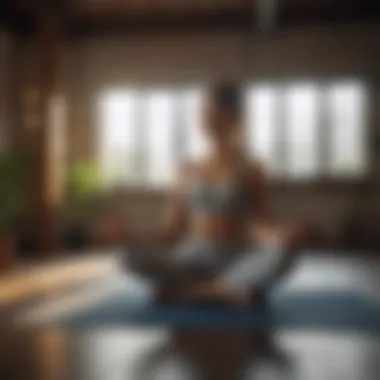Strategies for Finding Inner Peace: Expert Ways to Calm Anxiety


_Fashion Trends
_When it comes to managing stress and anxiety, one aspect that often gets overlooked is the role of fashion trends and style guides. Fashion can be a powerful tool in boosting confidence and self-esteem, which are essential in combating feelings of anxiety. By staying updated on the latest fashion trends and applying seasonal style guides, individuals can express their personality and feel empowered. Additionally, celebrity fashion lookbooks offer inspiration and ideas for creating versatile looks that reflect individual preferences and promote a sense of control in one's personal style. Accessories and styling tips play a crucial role in enhancing outfits and overall appearance, further contributing to a positive self-image and mindset.
Important: Fashion trends are not just about following popular styles but also about expressing individuality and personality.
- Following latest fashion trends
- Applying seasonal style guides
- Drawing inspiration from celebrity lookbooks
- Utilizing accessories and styling tips
_Beauty & Wellness
_Beauty and wellness are integral components of managing anxiety and stress effectively. Through beauty product reviews, individuals can discover skincare products and routines tailored to their specific needs, promoting skin health and self-care. Skincare routine tips offer practical guidance on cleansing, exfoliating, and moisturizing to maintain healthy skin and establish a relaxing self-care routine. Hair care secrets contribute to overall well-being and confidence, providing insights into how to maintain luscious locks and manage hair-related concerns. Makeup tutorials can serve as therapeutic practices, allowing individuals to explore creativity and enhance their features for a self-esteem boost.
Insightful: Taking care of your beauty and wellness not only enhances your physical appearance but also nourishes your mental well-being.
- Exploring beauty product reviews
- Incorporating skincare routine tips
- Discovering hair care secrets
- Experimenting with makeup tutorials
_Pop Culture & Entertainment
_Pop culture and entertainment offer a valuable escape from daily stresses, providing opportunities for relaxation and enjoyment. Staying updated on celebrity news and updates can be a pleasant distraction, allowing individuals to focus on light-hearted content and feel connected to current happenings. Movie and TV show reviews guide in selecting entertainment options that cater to personal preferences, promoting leisure time that fosters relaxation and mental rejuvenation. Music and concert highlights bring joy and inspiration, offering emotional connections through musical experiences. Book recommendations present avenues for intellectual stimulation and creativity, encouraging reading as a soothing pastime.
Feel-Good: Engaging with pop culture and entertainment can lift spirits and provide moments of relief from anxiety.
- Keeping up with celebrity news
- Reading movie and TV show reviews
- Enjoying music and concert highlights
- Exploring book recommendations
_Parenting Tips & Advice
_Parenting brings its unique set of challenges and joys, influencing mental well-being and stress levels. Pregnancy guides offer valuable information and support for expecting parents, guiding them through the journey of pregnancy with expert advice and resources. Newborn care tips assist new parents in navigating the early stages of parenthood, ensuring the well-being of their newborn and fostering a positive parent-child bond. Child development insights provide understanding and strategies for nurturing children's growth and development, contributing to a harmonious family environment. Family bonding activities create opportunities for shared experiences and quality time, strengthening familial relationships and promoting emotional resilience.
Rewarding: Parenting tips and advice enhance the parenting journey and foster positive family dynamics.
- Accessing pregnancy guides
- Implementing newborn care tips
- Utilizing child development insights
- Engaging in family bonding activities
_Politics & Social Commentary


_Politics and social commentary play a significant role in shaping perspectives and influencing societal well-being. Recent political events prompt critical thinking and awareness of current affairs, encouraging engagement in civic issues and informed discussions. Features on women in leadership highlight gender equality and empowerment, showcasing inspirational role models and advocating for diversity in leadership roles. Social issues discussions address pressing societal challenges, offering platforms for dialogue and advocacy towards positive change. Policy analysis and opinion pieces present thought-provoking insights into policy decisions and their implications on society, stimulating reflection and informed opinions.
Thought-Provoking: Politics and social commentary provide avenues for understanding complex issues and fostering informed discourse.
- Following recent political events
- Exploring features on women in leadership
- Participating in social issues discussions
- Reading policy analysis and opinion pieces
Understanding Anxiety
Anxiety, a complex emotional state, plays a crucial role in our article on managing stress effectively. Understanding Anxiety is like laying the foundation of a house before constructing it. To truly address and overcome anxiety, one must first grasp its intricacies, origins, and manifestations. By shedding light on this topic, we equip readers with the necessary knowledge to identify, comprehend, and manage their anxiety effectively. Without a deep understanding of anxiety, any attempt to alleviate its effects would be akin to navigating a labyrinth blindfolded. Therefore, delving into Understanding Anxiety sets the stage for implementing practical coping strategies and fostering mental well-being.
What Is Anxiety?
The essence of anxiety lies in its intricate interplay of thoughts, emotions, and bodily sensations. It is not merely a fleeting feeling of unease but a complex interplay of various factors. Anxiety surfaces as a natural response to perceived threats, whether real or imagined, triggering a cascade of physiological reactions. These can manifest as racing heartbeats, sweaty palms, or a constant sense of impending doom. Understanding what anxiety truly entails is key to differentiating normal worries from debilitating anxiety disorders. By unravelling the layers of What Is Anxiety, individuals can gain a clearer perspective on their own experiences and take proactive steps towards managing them.
Common Triggers of Anxiety
Anxiety, much like a multifaceted puzzle, can be set in motion by a multitude of triggers. These triggers vary from person to person, encompassing a broad spectrum of experiences and situations. Common culprits include excessive stress, unresolved trauma, unrealistic expectations, and a persistent fear of the unknown. By elucidating the Common Triggers of Anxiety, we empower readers to identify their personal triggers and confront them head-on. Recognizing these triggers not only sheds light on the roots of anxiety but also opens the door to tailored coping mechanisms and proactive stress management strategies.
Practical Techniques for Calming Down
In understanding anxiety, practical techniques for calming down are pivotal. These techniques play a crucial role in managing stress and enhancing mental well-being. By incorporating practical strategies, individuals can navigate feelings of anxiety effectively and find inner peace amidst daily challenges.
Deep Breathing Exercises
Deep breathing exercises serve as a cornerstone in anxiety management. By focusing on deep, slow breaths, individuals can activate the body's relaxation response, thereby reducing stress levels. This technique promotes oxygen flow, calms the mind, and enhances overall well-being. Incorporating deep breathing exercises into daily routines empowers individuals to combat anxiety and promote inner tranquility.
Progressive Muscle Relaxation
Progressive muscle relaxation is an effective method for releasing tension and promoting relaxation. By systematically tensing and relaxing muscle groups, individuals can pinpoint areas of stress and alleviate physical manifestations of anxiety. This technique fosters body awareness, reduces muscle tension, and cultivates a sense of calm. Through consistent practice, progressive muscle relaxation becomes a valuable tool in managing anxiety and achieving profound relaxation.
Mindfulness Meditation
Mindfulness meditation offers a holistic approach to calming the mind and body. By cultivating present-moment awareness and non-judgmental acceptance, individuals can reduce ruminative thoughts and promote mental clarity. Mindfulness meditation enhances emotional regulation, fosters self-compassion, and cultivates resilience in the face of anxiety. Introducing mindfulness meditation into daily routines equips individuals with the skills to navigate stressors and foster inner peace.
Creating a Calming Environment


In the realm of anxiety management, establishing a tranquil environment is paramount. Creating a Calming Environment plays a pivotal role in promoting psychological well-being by fostering a sense of peace and serenity amidst external chaos.
Especially for individuals grappling with anxiety, a harmonious space can significantly alleviate stress levels and enhance overall mental health. Research has shown that environmental factors directly impact our emotional state, making it crucial to curate spaces that evoke feelings of tranquility.
A clutter-free and soothing environment doesn't just look aesthetically pleasing; it can also have profound effects on our inner state.
By consciously crafting a serene atmosphere, one can reduce inner turmoil, enhance focus, and cultivate a sense of calm that extends beyond the physical realm. From decluttering to incorporating soothing elements, each facet contributes to a restorative environment conducive to emotional well-being.
Decluttering Your Space
Decluttering, often underestimated in its impact, can be a potent tool in combatting anxiety. The act of minimizing material distractions declutters not just the physical space, but also the mind. By simplifying surroundings, individuals create mental breathing room and promote clarity in their thoughts and emotions.
Decluttering serves as a mindful practice, encouraging individuals to prioritize essentials and rid the space of unnecessary clutter that may trigger feelings of overwhelm and unease. Studies indicate a direct link between clutter and stress levels, making tidying up a powerful strategy for anxiety management.
Incorporating Aromatherapy
Aromatherapy, a centuries-old practice, leverages aromatic essences to influence mood and promote relaxation. By integrating essential oils into one's environment, individuals can harness the therapeutic benefits of scent to combat anxiety and induce a calming effect.
Different scents hold varying properties, with lavender known for its soothing qualities and citrus scents for uplifting moods. Incorporating Aromatherapy allows individuals to customize their environment to their emotional needs, creating a sensory haven that fosters tranquility.
Soft Lighting and Relaxing Music
The impact of lighting and sound should not be underestimated when designing a calming space. Soft, warm lighting can create a cozy atmosphere, while gentle music or nature sounds provide a backdrop of relaxation. Research suggests that dim lighting and serene tunes can lower heart rates and cortisol levels, promoting a state of peace.
By enveloping oneself in soft light and soothing melodies, individuals can signal to their bodies that it is time to unwind and release tension. Through intentional choice of lighting and sound, crafting a tranquil environment becomes a sensory journey towards inner calm.
Stress-Relief Activities
In this section, we delve into the importance of stress-relief activities within the broader context of managing anxiety and promoting mental well-being. Stress-relief activities play a pivotal role in our daily lives, offering a much-needed reprieve from the hustle and bustle of modern society. By incorporating stress-relief activities into our routines, we can effectively mitigate feelings of anxiety and rejuvenate our minds.
Engage in physical exercise provides a holistic approach to stress management, benefiting both the body and mind. Through physical exertion, endorphins are released, known as the body's natural mood lifters, reducing stress and improving overall well-being.
Journaling and creative outlets serve as therapeutic tools to express pent-up emotions and thoughts. By jotting down feelings or engaging in creative endeavors, individuals can gain clarity and release inner tensions, fostering a sense of mental relaxation.


Dedicating time to spending in nature offers a serene escape from urban chaos. Nature's calming effect promotes mindfulness and reduces stress levels, allowing individuals to connect with the environment and find solace in its tranquility.
A balanced combination of these stress-relief activities can significantly enhance one's ability to cope with anxiety and lead a more balanced life. By incorporating physical exercise, journaling, and spending time in nature into your routine, you pave the way for a calmer and more centered existence.
Healthy Habits for Better Mental Health
Understanding the significance of healthy habits for better mental health forms a fundamental aspect of this article on managing stress and anxiety. In the quest for emotional well-being, adopting a lifestyle revolving around beneficial habits is paramount. By focusing on specific elements like self-care practices, dietary choices, and sleep patterns, individuals can cultivate resilience against anxiety triggers.
Balanced Diet and Hydration
A balanced diet and adequate hydration are pillars of mental wellness. Consuming a variety of nutrient-rich foods ensures the body and mind function optimally. Foods rich in omega-3 fatty acids, antioxidants, and vitamins play a pivotal role in mood regulation and stress reduction. Hydration, often overlooked, is crucial for cognitive function and emotional stability. Adequate water intake aids in maintaining focus and alleviating anxiety symptoms.
Quality Sleep and Rest
Quality sleep and adequate rest are non-negotiable for mental health maintenance. Creating a bedtime routine, optimizing sleep environment, and practicing relaxation techniques contribute to restful sleep. Sleep plays a vital role in cognitive function, emotional regulation, and overall well-being. Prioritizing sufficient rest allows the brain to process emotions effectively and enhances resilience against daily stressors.
Setting Boundaries and Prioritizing Self-Care
Establishing boundaries and prioritizing self-care are essential components of mental health upkeep. Saying no when necessary, setting limits on commitments, and carving out time for relaxation are crucial aspects of self-care. Engaging in activities that bring joy and fulfillment promotes emotional balance and decreases the likelihood of overwhelm. Self-care reflects self-worth and nurtures a positive self-image, fostering emotional resilience.
Seeking Professional Help
Seeking professional assistance for managing anxiety is a crucial step towards addressing complex emotional challenges effectively. When facing persistent feelings of anxiety that seem overwhelming, seeking professional help can provide valuable support and guidance in navigating the intricate landscape of mental well-being. Therapists and counselors trained in cognitive-behavioral therapy, mindfulness techniques, or other modalities can offer personalized strategies to cope with anxiety triggers and enhance resilience.
- Elements of Seeking Professional Help:
- Personalized Treatment Plans: Professionals tailor interventions to individual needs, focusing on holistic well-being.
- Skill Development: Learn coping skills and techniques to manage anxiety effectively.
- Emotional Support: Receive validation and understanding in a non-judgmental environment.
Expert Tip: Finding the right therapist is essential for a productive therapeutic journey.
When to Consider Therapy or Counseling
It's essential to navigate the decision of when to consider therapy or counseling with attentiveness to personal well-being. Recognizing the signs indicating the need for professional help is pivotal in fostering mental wellness. Consider therapy or counseling when experiencing:
- Persistent Anxiety: Uncontrollable worry, fear, or panic attacks impacting daily life.
- Difficulty Coping: Inability to manage stress or regulate overwhelming emotions effectively.
- Interference with Functioning: Anxiety hindering work, relationships, or daily activities.
- Benefits of Therapy or Counseling:
- Increased Self-awareness: Gain insights into triggers and patterns influencing anxiety.
- Cognitive Restructuring: Challenge and alter negative thought patterns contributing to anxiety.
- Empowerment: Acquire tools to regain control and build resilience against anxiety.
Seeking help is a sign of strength and self-care.







